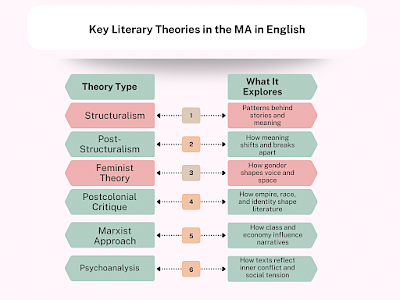From Classic Texts to Contemporary Thought - M.A. in English Isn’t Just a Degree, It’s a Lens on the World

Blog / August 24, 2025
Masters in EnglishM.A. in EnglishM.A. English DegreeAs C.S. Lewis once wrote, “Literature adds to reality, it does not simply describe it. It enriches the necessary competencies that daily life requires and provides, and in this respect, it irrigates the deserts that our lives have already become.”
Language is never just a medium of communication; it is history, identity, memory, and power because words carry weight, and stories shape societies.
But the query that can come into anyone’s mind is why does one still study literature and language in an age run by code, numbers, and algorithms, and when there’s pressure to pick degrees tied to quick jobs?
Simple. Because every time one reads a story, poem, or play, one learns how the world works. One sees how language builds power, identity, conflict, and hope.
This is not about nostalgia or escape. It’s about changing how one sees everything, from a news headline to a poem, a film scene to a political speech.
Table of Contents
- The Relevance of English in a Changing World
- Where the Great Stories Begin: Learning from the Literary Past
- Theoretical Frameworks to Explore Literature as Method, Critique, and Inquiry
- Pluralizing Voices: Literature Beyond the Centre
- Reading the Contemporary: Texts, Media, and the Cultural Moment
- Read Beyond the Page, Think Beyond the Obvious: Begin Your Journey @Shiv Nadar University (Institution of Eminence)
- Conclusion
- FAQs
The Relevance of English in a Changing World
As we all know, English is the most spoken language in the world, studying English is not simply about reading texts. It is to learn the way of understanding how people think, speak, resist, and change - across time and place. From the roots of literary thought to current global realities, a course in English language trains students to read deeply and ask better questions.
This is where the M.A. in English stands apart.
With the M.A. in English, the answer isn’t limited to just reading more novels or analyzing metaphors. It’s about changing how one sees everything, from a news headline to a poem, a film scene to a political speech. It is built to shape readers who can challenge what they read, link ideas across time, and speak with clarity and purpose.
Where the Great Stories Begin: Learning from the Literary Past
The M.A. in English opens with the foundation: texts that have influenced generations.
But the approach is not passive. Students don't read Shakespeare or Milton to recite lines. They read them to study how they shaped ideas of war, morality, identity, and power.
Key authors include:
|
Author |
Known For |
|
William Shakespeare |
Human conflict, politics, and ambition |
|
John Milton |
Religion, justice, and rebellion |
|
T.S. Eliot |
Modern crisis and cultural loss |
|
Virginia Woolf |
Consciousness, gender, and time |
In these classes, students do not just analyze structure or plot. They study how these texts:
- Reflect historical values
- Silence certain groups
- Promote or question dominant norms
But these texts are not taught like sacred scripture. They are studied as cultural documents: full of power, but also full of silence.
It empowers students to ask:
- Who was allowed to speak?
- Whose stories were erased?
- Why do these works survive?
- Who decides what counts as classic?
- What worldview does the text promote?
- What is left unsaid?
These questions move beyond literary trivia. They open up real-world debates.
Regardless of future ambitions in teaching, writing, or media, this study sharpens and clarifies people's thinking. This part of the M.A. in English subjects lays the groundwork for a more deeply involved inquiry.
Theoretical Frameworks to Explore Literature as Method, Critique, and Inquiry
After grounding students in classical texts, the course moves on to the next stage.
Now comes the lens: Literary Theory.
Theory sounds heavy at first. But in this course, it becomes practical. It teaches students how to read between the lines & how to question what looks obvious.
Theory is not an extra chapter, it is central. It’s what trains one to look at text, media, or speech and ask:
- What power is at work here?
- What values are hidden in this sentence?
- What’s the meaning beneath the form?
Here’s how the M.A. in English syllabus introduces key frameworks:

Theory trains one not just to understand text, but to connect it to life, politics, media, and society. Students build skills such as:
- Critical thinking
- Interpretation
- Argument writing and
- Cultural reading
These skills do not make way for a career in academics only; in fact, graduates work in different sectors including:
- Journalism
- Law
- Advertising
- Scriptwriting
- Public policy
- Publishing and
- Education
One learns to question messages in the news, social media, films, and political speeches.
That is the power of theory - it sharpens one’s lens far beyond the classroom. It prepares students not just for exams but for decisions in real-world scenarios.
Pluralizing Voices: Literature Beyond the Centre
One can't study literature today by reading only Western classics. The world has too many voices to ignore.
The M.A. in English syllabus now brings in writers who speak from the margins - not to fill a quota but to question the centre.
This shift is not about reading for diversity. It's about hearing how different societies write about power, identity, language, and resistance.
In many top universities, and increasingly in Indian institutions, this part of the MA gives students a chance to explore literature as a global conversation. Here’s how that looks in practice:
Core M.A. in English subjects in this space include:
- Indian Writing in English
- World Literatures
- Dalit Literature
- Regional Literatures in Translation
- Postcolonial and Decolonial Studies, and
- Translation Studies
When students study Mahasweta Devi and Ngũgĩ wa Thiong’o together, they start to connect caste, class, race, and resistance across geographies.
M.A. in English also looks at translation not as language work, but as cultural interpretation.
What gets lost? What gets reshaped?
These questions help students think critically across language, region, and politics. They learn about how regional stories shape national identities, learn how Dalit voices are rewriting the concept of literature itself, and learn that English is not a neutral language; it carries power, history, and bias with it.
And for careers? This skillset matters in:
- Cultural journalism
- Public policy
- Publishing and editing
- International development and
- Curriculum design
Students graduate not just as a reader of texts, but as a reader of systems and silences.
Reading the Contemporary: Texts, Media, and the Cultural Moment
Today’s English language degree courses, like the M.A. in English, don’t stop at poetry and prose. The best programs extend into the present, asking students to read what’s happening around them with literary tools.
This means treating social media, protest slogans, advertisements, films, etc, as texts.
Why?
Because these forms shape how people think and act. To cover all these in the syllabus of M.A. in English subjects, such as:
- Cultural Studies
- Literature and Visual Culture
- Digital Writing
- Media Writing and
- Gender and Media
are now frequently getting included by the top universities.
Students learn how metaphor moves from books to screens, and how meaning gets built through visuals, sound, and form. This part of the syllabus is where the degree becomes most future-facing. Students see:
- How literature can read misinformation
- How culture shapes narrative and
- How storytelling happens across platforms
It also equips students for work that demands interpretation, cultural literacy, and insight - skills now valued across media, corporate, and research sectors.
Read Beyond the Page, Think Beyond the Obvious: Begin Your Journey @Shiv Nadar University (Institution of Eminence)
Selecting the ideal university for an M.A. in English means finding a place that promotes sustained and deep reading, sharp thinking, and participation in meaningful dialog with the world. Shiv Nadar University offers one of India’s most thoughtfully curated M.A. in English programs, rooted in rigorous academics, global relevance, and intellectual freedom.
Our alumni have gone on to pursue further studies at Berkeley, King’s College London, Chicago, Melbourne, and more, as well as to shape careers in media, publishing, consulting, NGOs, academia, etc.
The university blends interdisciplinary freedom with research-led teaching. It offers a setting where curiosity is not boxed in by departments, and where literature engages actively with fields like politics, sociology, media, and public life. The final thesis, guided through one-on-one supervision, offers space to pursue deep, original research on topics that matter.
If you’re looking for a program that doesn’t just respond to the times but helps shape them, the School of Humanities and Social Sciences at Shiv Nadar University is where it begins.
Conclusion
The M.A. in English is not defined by one type of text or one career path.
It is shaped by a progression, from reading foundational literature to asking sharper questions, understanding texts across time and place, to writing with both clarity and insight, centering marginal voices, and decoding today’s media.
The program begins as a literary study and becomes a way to understand society, identity, and influence across platforms. Every subject in the M.A. in English syllabus works toward one goal: sharpening how one thinks, reads, and writes in a complex world.
Whether one enters academia, journalism, publishing, or policy, this lens is not just useful; it’s necessary. In a world full of noise, this degree teaches one to listen, think, and speak with purpose.
Explore the M.A. in English at Shiv Nadar University, where the study of literature becomes training in leadership, analysis, and cultural intelligence. Gear up and apply now.
FAQs
What is the scope of an M.A. in English in today’s job market?
The scope is broad; graduates can work in teaching, research, content strategy, publishing, journalism, cultural consultancy, or academic administration. Many also pursue careers in civil services, international NGOs, or creative industries.
Can I pursue non-academic careers after an M.A. in English?
Yes, you will gain skills such as critical thinking, writing, and cultural reading, which you can apply to work in media, content writing, advertising, public relations, publishing, policy, and even UX writing.
Is the M.A. in English a future-ready degree?
Yes. As new forms of communication emerge, this course adapts. It prepares students not just to read texts but to understand narratives shaping society, politics, and identity.